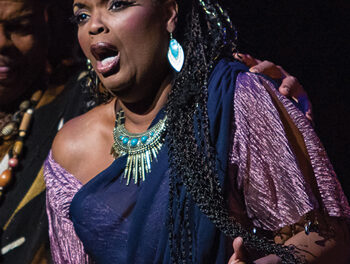NC State LIVE is known for its dynamic, diverse, and progressive programing, and this performance by Chanticleer was no exception. The presenter is one of six performing and visual arts organizations affiliated with Arts NC State. NCSU students and the community at large are fortunate to be able to experience world-class artistic line ups on a regular basis.
Returning to NCSU after 25 years and performing to a nearly full house, Chanticleer ended its 52-city world tour for their newest album, Then and There, Here and Now on a brisk Friday evening at Stewart Theatre.
Celebrating their 40th anniversary, the 12-person ensemble’s musical aesthetic spans the vast expanse of five centuries. This program was sectioned into seven parts, beginning with a short set of three works by Renaissance masters. Commencing with the ethereal “Surrexit pastor bonus” (di Lasso), the group immediately engaged with one another, locking eyes and listening to produce a perfect balance of sound within this modern space.
In the complex “Gaude gloriosa” (Palestrina) one could feel that the music was quite alive within the singers! In the even more dense Gibbons setting of “O Clap Your Hands,” the group moved from a semi-circle to form a tighter, mixed grouping that effectively allowed them to hear one another and also to beautifully produce the different sonorities that began to flower in the latter portion of the Renaissance era.
One of the most interesting sections came next – a pairing of William Byrd’s “Ave Verum Corpus” with contemporary composer Steven Stuckey‘s “Whispers.” Commissioned for Chanticleer’s 25th anniversary, Stuckey took his inspiration from the Walt Whitman poem, “Whispers of Heavenly Death” and Byrd’s motet, in that both of these artistic efforts work to transmute images of death into “not sadness, but instead a kind of mystical exaltation.” With a four-voice semicircle just behind another, larger one of eight, this piece was much more difficult to control but was, in the end, sung to spine-tingling effect. Here’s to the hope of inspiring more conversations within musical periods.
The mood was lightened with “Nude Descending a Staircase” (Allen Shearer). Inspired by the Duchamp painting, X.J. Kennedy‘s poem is, at the same time, sensuous and funny. Chanticleer took full advantage of the textual painting, making the audience (and themselves) giggle in delight on several occasions.
As a palate cleanser, the ensemble sang the well-known “Now is the Month of Maying” (Morley) with perfection and ease, followed by a commissioned work by Mason Bates – “Stelle, vostra mercé l’eccese sfere” – with gorgeously lush chordal structures. Chanticleer wowed the audience with their emotive and precise execution of this deceptively simple but clearly difficult piece.
The group really seemed to need and enjoy a break into more full-throated singing of Strauss’ Drei Männerchöre, Op. 45, proving their impeccable blend no matter what period of music.
After intermission, Chanticleer began with a moving work by Steven Sametz called “I Have Had Singing.” The text is attributed to an 80-year-old horseman from the north of England named Fred Mitchell who, in an interview, described the difficulty of working there in the early 20th century. However, it was not all bad for Mitchell. In the true tradition of the English culture, he recalled, “But there was always singing, the boys in the field, the chapels were full of singing. I have had pleasure enough. I have had singing.” While Sametz is an American, he certainly seems to have understood the British choral sound, and Chanticleer captured that soul quality as well in this short but profound work.
Going forward, things lightened considerably, with the Gershwin/K. Shaw arrangement of “Summertime” in which countertenor Cortez Mitchell sang so beautifully that I am certain quite a few sopranos in the audience might have thought to throw in the towel.
Other audience pleasers were the infectious traditional Irish tune “Dúlamán” (arr. Michael McGlynn) and the Hungarian-Romanian traditional “Járbã, máré járbã” with a fantastic solo by tenor Andrew van Allsburg.
Chanticleer’s performance of Duke Ellington’s “Creole Love Call” (arr. Harry Frommermann) had to be heard and seen to be believed. Tenor Brian Hinman‘s imitation of the trumpet was simply outstanding. The countertenor work in “I Want to Die Easy” (arr. A. Parker/R. Shaw) was, again, jaw-dropping.
Chanticleer ended their set with a gospel/R&B-influenced version of “Straight Street” (Alexander/Whitacker), but they were quickly back on stage after a roaring standing ovation – which prompted the singers to joke about how surprised they were to have had such an enthusiastic audience on an NCSU Homecoming/game day. They left us with a rendition of Rodgers and Hart’s “My Romance.”
Many thrilled listeners were able to chat with the ensemble members in the lobby afterwards and to buy the new There and Then, Here and Now CD. The group flew back to California for a short tour break before they begin their Christmas tour at the end of November. No rest for the weary, but what a fantastic concert! Kudos to NC State LIVE director Sharon Moore for bringing, yet again, great art to the Triangle.











